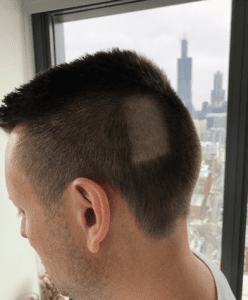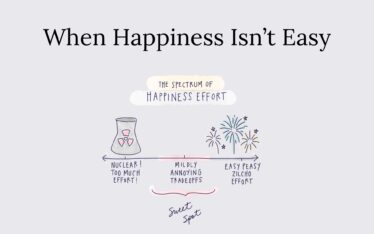Despite our best efforts to live astonishing, gleeful, downright picturesque and consistently perfect lives, sometimes we f*#k things up. Sometimes we make decisions that make us shake our heads and wonder what we were thinking when we said “cheers!” to that fifth shot of gin (not that I have any experience with that at all in October of 1994).
My mom used to wear a “LIFE SUCKS AND THEN YOU DIE” button on her acid wash jean jacket in the 80s, so I grew up with very reasonable expectations about how life was going to go down. It was clear from the start that even though life had intoxicating highs, life wasn’t going to be flawless or even approach the edges of perfection. Mistakes were going to be made (acid wash denim being a notable example).
Years ago a phlebotomist told me, as I whimpered like the baby I become within a 12-foot range of needles, that pain was inevitable and suffering was optional. I simply relaxed my arm and decided not to suffer, with her Buddhist words of wisdom coursing through the very veins she was puncturing. If it was an option to suffer, I was definitely going to opt out.
While we can’t always control the frequency, intensity, or duration of our foibles, we can control how we respond when (not if, but when) we make mistakes. We can opt out of suffering and instead go for amusement.
Turning mishaps into memories (good ones, at that).
Several years into our relationship, The Husband and I came up with one of the best ideas of all time (second only to having nachos in bed every New Year’s Day — an idea you too can adopt to kick the year off right). Surrounded by both silly and significant bad choices in the course of living our lives, we found ourselves reminiscing about our “bad calls” with fondness as the passing of time softened their blows.
(Buying the deeply discounted “holiday ham” at the grocery store one Christmas in Aspen, for example, seriously sucked when we arrived at our remote cabin only to find that the ham was dangerously past its prime. At the time we were bummed to eat potatoes with a side of potatoes for our holiday dinner, but the holiday ham memory is now priceless, as is the memory of how we tried to dispose of the rotting pork carcass in the middle of the frozen woods.)
At some point laughing at our blunders led to the epiphany of chronicling them for posterity’s sake, and so The Book of Bad Calls was born. We drove to the bookstore (like people used to do in the early 2000s) and bought a skull-covered journal to capture every “smile at it now but at the time it was terrible” moment. We knew we’d have endless content to fuel smiles into our dementia-filled years (because of the whole “life sucks and then you die” thing) and we were bizarrely stoked about it.
You know what we didn’t expect? That the book would change our actual experience of having things go wrong. We noticed that the moment of being in a “bad call” was more amusing and lighter than it used to be. We’d announce with giddy conspiration that “this one’s for The Book of Bad Calls, the minute we get home!” while staying in an underwhelming Airbnb, for example. Instead of wallowing in the less-than-expected experience, we’d enthusiastically look for more fodder to add to the BOBC. “And look! They only have one-ply toilet paper. Book. Of. Bad. Calls.” (Giggle, giggle.)
Thinking of starting your own Book of Bad Calls?
Do it! The BOBC entries can range from the innocuous and amusing to the mildly catastrophic; there’s room in your book for mess-ups of all shapes and sizes.

Let no mistake seem too small to count as an entry. Many of our early bullet points were from the days where you’d rent a movie (like with money!) and realize six minutes in that you were in for trouble. (Nowadays with streaming it’s easy to stop a movie when you can no longer tolerate the talentless child actor.) We have many an entry about food gambles that didn’t pay off — like coconut yogurt (just no), trying to make pot stickers (those fuckers really do stick to the pot), and any of my old baking disasters. I started cutting The Husband’s hair in the pandemic and naturally this little doozy from January 2021 made the book in an instant (note the picture of the minor massacre mistake I made).
The stakes can be higher on some bad calls, of course — perhaps monetarily (like buying a property about 15 minutes before the 2007 global financial crisis: fun times!), or emotionally (like accepting a job that sucks the entire soul out of you, and even a bit of bone marrow). You might make bad calls about relationships, where you go to school, getting featured on Botched (that plastic-surgery-gone-awry show), and the list goes on with the myriad ways you can make the wrong move.
The Husband and I just got a place in Palm Springs, which will be drastically different than our current lifestyle in Chicago (and not just in ºF); I’m already reassured that if for some reason it becomes an unmitigated disaster, it will just make for an all-caps entry in the BOBC. Having The Book of Bad Calls almost makes me feel like we can’t lose.
To be clear, this isn’t about making a list of all the shitty things that happen to you so you can ruminate about them into the wine-stained wee hours of the morning… it’s about goofily recording the crappy decisions you make that are worth poking yourself in the ribs about — to lighten up and not take yourself so seriously.
What’s the moral of the story?
I see three main takeaways:
- The Book of Bad Calls helps you gain a new perspective on your missteps — and we all need a bit of comedic relief on our slightly spazzed-out pandemic planet.
- It’s better to have lived and mucked up a bit, than to never have made mistakes at all — because really: do you want to get to your deathbed with an empty Book of Bad Calls? Wouldn’t that mean you didn’t take the risks required to REALLY LIVE? You know this is true. There is no room for inertia in a vitality-filled life. We’re clear on that?
- Never buy significantly marked down ham. Ever.







